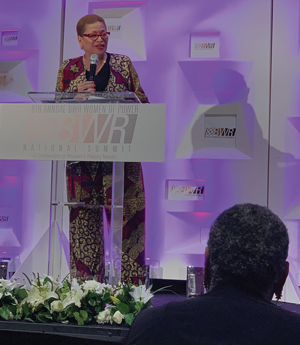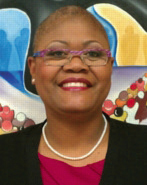Black Women’s Roundtable convenes in D.C. to launch policy initiatives
By Nisa Islam Muhammad -Staff Writer- | Last updated: Apr 9, 2019 - 12:17:09 PMWhat's your opinion on this article?

Dr. Julianne Malveaux presents during The National Coalition on Black Civic Participation’s Black Women’s Roundtable in Washington, D.C. Photo: Nisa Islam Muhammad
|
The gathering brought together Black women leaders and allies from across the country for five power packed days to share the organization’s public policy agenda priorities with the 116th Congress, develop organizing and empowerment strategies to lift up and improve the lives of Black women, their families and communities and more.
“Each year the BWR Women of Power Summit serves as the premier forum focused on showcasing and lifting up the unique power, leadership, expertise, talents and influence of Black women from diverse backgrounds and ages” explained Melanie L. Campbell, president & CEO, NCBCP and convener of the Black Women’s Roundtable.

Melanie L. Campbell
|
This year’s theme, “It’s Time to Lead, Rise, and Shine,” embodied the BWR Summit’s mission to empower Black women and girls to build, organize, and strategize to leverage their collective and individual economic and political power.
The summit was held March 14- 19 and featured workshops on race and gender equity, economic security and prosperity, income inequality, health, and economic issues.
Felicia Davis, co-founder of the HBCU Green Fund and director of the Building Green Initiative at Clark Atlanta University led the workshop on “Higher Education: Saving our HBCUs.” She shared tips for parents with college-bound children.
“When your child is looking for an HBCU, insure a good institutional fit. Consider where they’ve grown up and what they’ve done. Does it have the field they are looking for? A quiet child might not be good in a loud city school,” she explained.
“Consider the finances. Don’t do anything you can’t afford. Get the money or pick a different option; debt versus return. Today loans assess the parents’ credit score. As a parent don’t send your child some place you’ve never been,” she added.
Erica Southerland Ph.D., a senior communications consultant, spoke on the importance of understanding that HBCUs are not a monolithic. “There are just a little over 100 HBCUs. They are all different. Most were founded when Black people didn’t have a choice to go anywhere else. Students need choices.”
The conference also included a closing session: A National Town Hall Meeting and Call to Action—Leveraging the Power of the Sister Vote & Leadership in 2020 Presidential Election, 2020 Decennial Census and 2021 Redistricting.
Economist Dr. Julianne Malveaux spoke on the fragile state of family economics that was revealed by the 35-day government shutdown. It revealed that most American’s are not prepared financially. “Forty percent of all Americans, this is not Black Americans, this all Americans, could not absorb a $400 emergency. What is a $400 emergency? Your engine blows on your car. Someone throws a rock at your windshield. Your child is rushed to the emergency room and they ask you before they look at your child, for your copay,” explained Dr. Malveaux.
Other critical subjects during the summit focused on Black women and Black girls in concurrent sessions and included: “Sisters Vote Roundtable: A Look Back at 2018: Black Women Lead Power Shift,” “Black Girl Power Roundtable: Emerging Leaders Share Their Stories About Owning Their #BlackGirlPower in 2018!” sessions on health and wellness, entrepreneurship, civil rights and social justice and much more.
On March 22, just days after the conference, BWR released their 6th Annual Report titled: “Black Women in the United States, 2019—Centering Black Women & Girls Leadership & Public Policy Agenda in a Polarized Political Era.”
“This was a group effort of Black women brilliance,” explained Dr. Avis Jones-DeWeever, editor-in-chief for the 2019 BWR Report. “This year represents the 50th year since the first Black woman was elected to Congress, Shirley Chisholm. Here we are 50 years later and we have 25 Black women serving in Congress. A wonderful achievement. Five of those women are new with the last mid-term election. All are Democrat and all but one is 45 and younger,” said Dr. Jones-DeWeever
“Unlike most of the first members of the Congressional Black Caucus none of this new class of Black women represents a majority Black district. They are in fact representing districts that don’t look like themselves in many ways. This is a profound point that shows that Black women can be elected anywhere. In fact, there is no place that is off limits to our leadership.”
Highlights of the report include: Why Black Women Vote and What They Want, Discipline Disparities Plague Black Girls’ K-12 Education and much more.
To address the many challenges Black women and girls continue to face, The National Coalition on Black Civic Participation’s Black Women’s Roundtable will implement its 2019 BWR Racial, Economic and Gender Justice Empowerment Project (BWR Justice Project ‘19) and expand its BWR state-based networks in California, Louisiana, Mississippi and other states.
INSIDE STORIES AND REVIEWS
-
-
About Harriett ... and the Negro Hollywood Road Show
By Rabiah Muhammad, Guest Columnist » Full Story -
Skepticism greets Jay-Z, NFL talk of inspiring change
By Bryan 18X Crawford and Richard B. Muhammad The Final Call Newspaper @TheFinalCall » Full Story -
The painful problem of Black girls and suicide
By Charlene Muhammad -National Correspondent- » Full Story -
Exploitation of Innocence - Report: Perceptions, policies hurting Black girls
By Charlene Muhammad -National Correspondent- » Full Story -
Big Ballin: Big ideas fuel a father’s Big Baller Brand and brash business sense
By Bryan Crawford -Contributing Writer- » Full Story






 Click Here Stay Connected!
Click Here Stay Connected!








